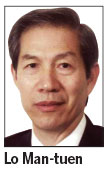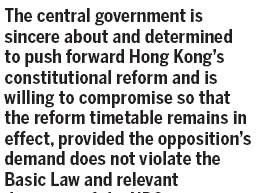Compromise essential for progress
Updated: 2013-04-12 06:10
By Lo Man-tuen(HK Edition)
|
|||||||

The opposition camp has maintained its confrontational posture over the universal suffrage issue after the central authorities made its bottom line crystal clear: those who oppose the central government cannot be the chief executive. Their hardnosed behavior indicates they are determined to fight the central authorities without compromise. Now many people are worried Hong Kong residents' wish for the Chief Executive Election by universal suffrage in 2017 will be dashed.
It is widely agreed that politics is the art of compromise while tolerance is part of the basis for democratic development. There have been numerous examples throughout the world and history of a win-win situation achieved through compromise when the two disputing sides find a mutually beneficial way. The United Kingdom, which maintained colonial rule over Hong Kong for more than 150 years, is a ready example of democratic advancement through the politics of compromise, as illustrated by the preservation of such symbols of autocracy as the royal family and the House of Lords (upper chamber of Parliament). Negotiations over the issue of the royal family and House of Lords receding their governing power (to the democratically elected government and House of Commons) were a long process that largely spared the country of the pains brought by violent revolutions.
The Republicans and Democrats of the United States, despite their striking differences over such issues as the federal debt ceiling and fiscal cliff, managed to compromise at the last minute to prevent a mighty blow to the nation's economy. Today the US is at odds with China over its "return to Asia", while Japan finds itself in territorial disputes with China over the Diaoyu Islands in the East China Sea, but neither US President Obama or Japanese Prime Minister Abe wants to confront China in a war, as both insist on negotiation instead of clashes. These examples should inspire the opposition in their relationship with the central government, particularly concerning the issue of universal suffrage.

The history of Hong Kong's constitutional reform also shows that progress is impossible without compromise. A required majority of at least two-thirds of all the legislative councillors for the passage of any constitutional reform plan, as stipulated by the Basic Law, means that the opposition parties, which hold the critical minority votes in LegCo, can kill any reform plan they want to. No constitutional reform plan can proceed if the opposition camp refuses to compromise. It happened in 2005 when the opposition insisted on tying the government's constitutional reform plan to their own demands that all but blocked democratic progress. In 2012 Hong Kong finally achieved a major step forward in constitutional reform thanks to a consensus reached between the Democratic Party and the Central People's Government Liaison Office in the Hong Kong SAR following compromises by both sides in 2010.
The fact is, the central government made a significant compromise in 2010 that facilitated the constitutional reform progress in 2012. In 2010, the Democratic Party's demand for "two votes per voter" was rejected by Qiao Xiaoyang, director of the National People's Congress (NPC) Law Committee, citing suspicion by "many organizations and individuals" that it amounts to a de facto direct election and may be in violation of the Basic Law and relevant decisions of the NPC. The central government remained steadfast in its position over the way the five "super district councilor seats" would be filled, until the Democratic Party made a minor change in its demand in return for a major concession by the central authorities that convinced the DP to agree to vote in favor of the government's reform plan. This episode confirms the fact that the central government is sincere about and determined to push forward Hong Kong's constitutional reform and is willing to compromise so that the reform timetable remains in effect, provided the opposition's demand does not violate the Basic Law and relevant decisions of the NPC.
Last year LegCo saw the number of seats increase to 70, with three of the five newly-added "super district councilor seats" taken by opposition candidates, two of whom were DP members. This proves compromise does not benefit the pro-establishment side only, as the opposition now enjoys more room for political development.
Currently Hong Kong's constitutional reform is at a vitally important crossroads over the implementation of universal suffrage. The opposition camp must think very carefully which way it wants to go: being rational and pragmatic to achieve a win-win situation through mutual compromise and following the Basic Law and relevant decisions of the NPC, or being hell-bent on confrontation by insisting on challenging the central government's bottom line as well as the Basic Law and rendering universal suffrage in Hong Kong hopeless.
The author is a Hong Kong member of the CPPCC and vice-president of the All-China Federation of Industry and Commerce.
(HK Edition 04/12/2013 page1)